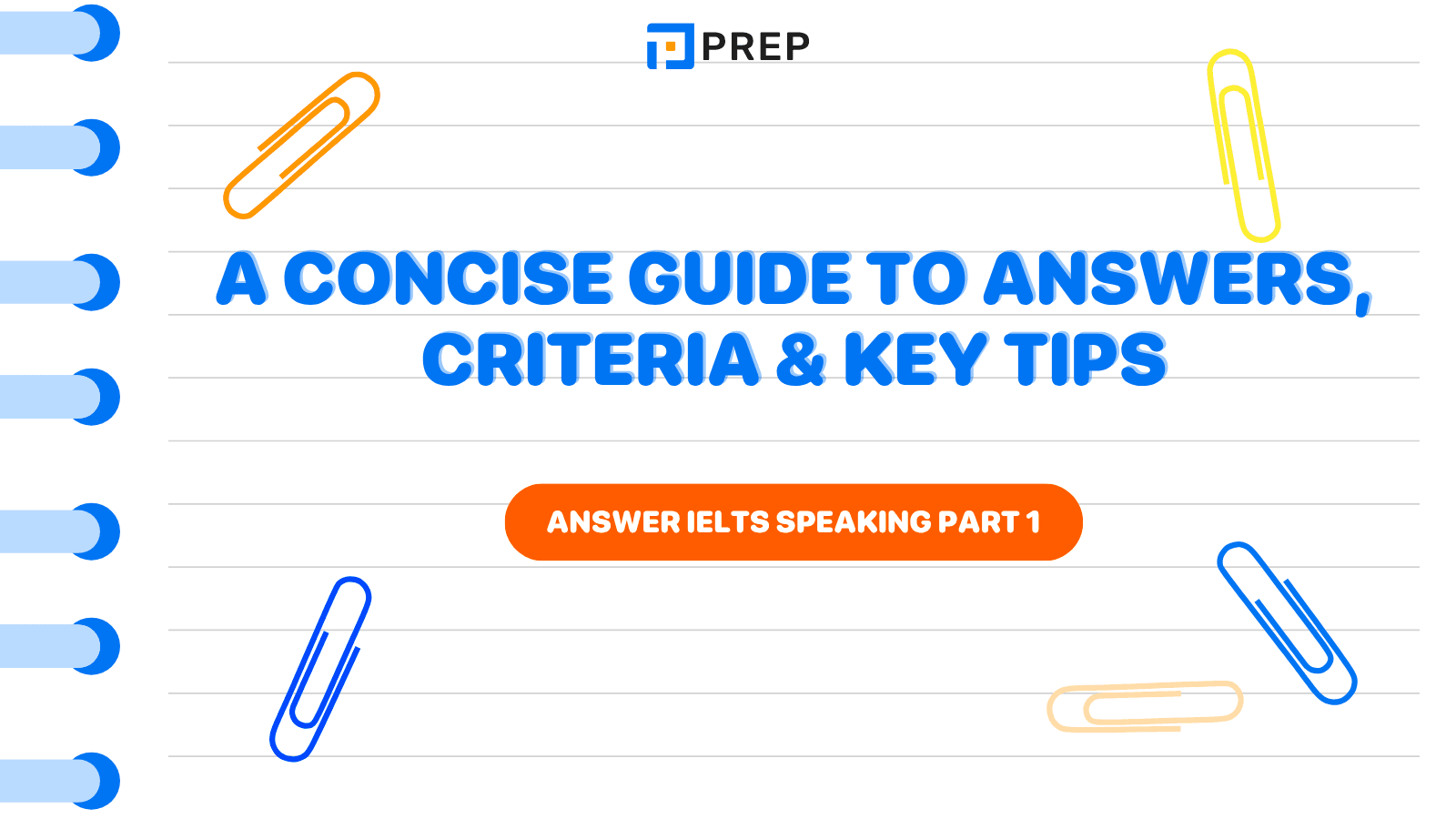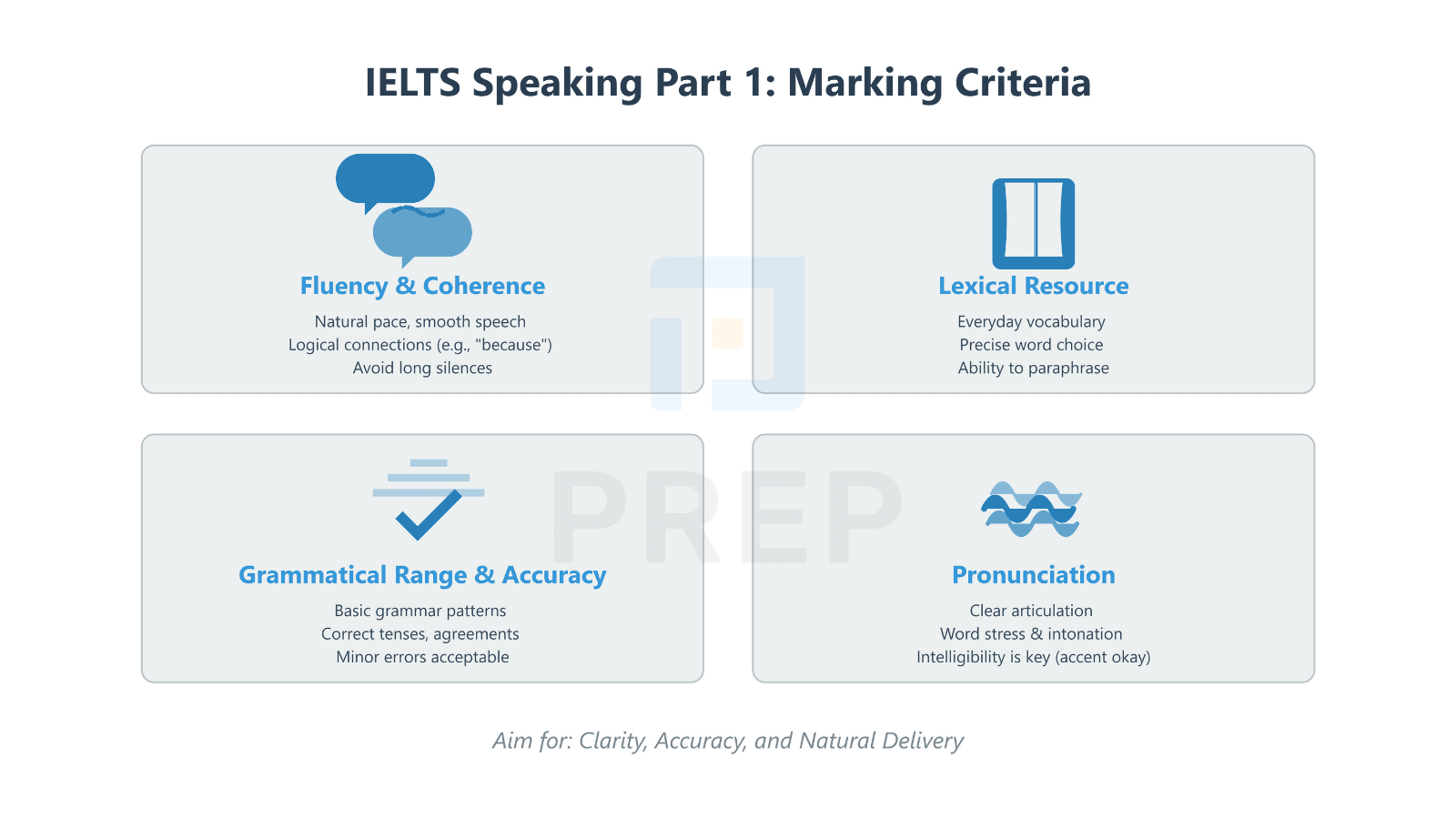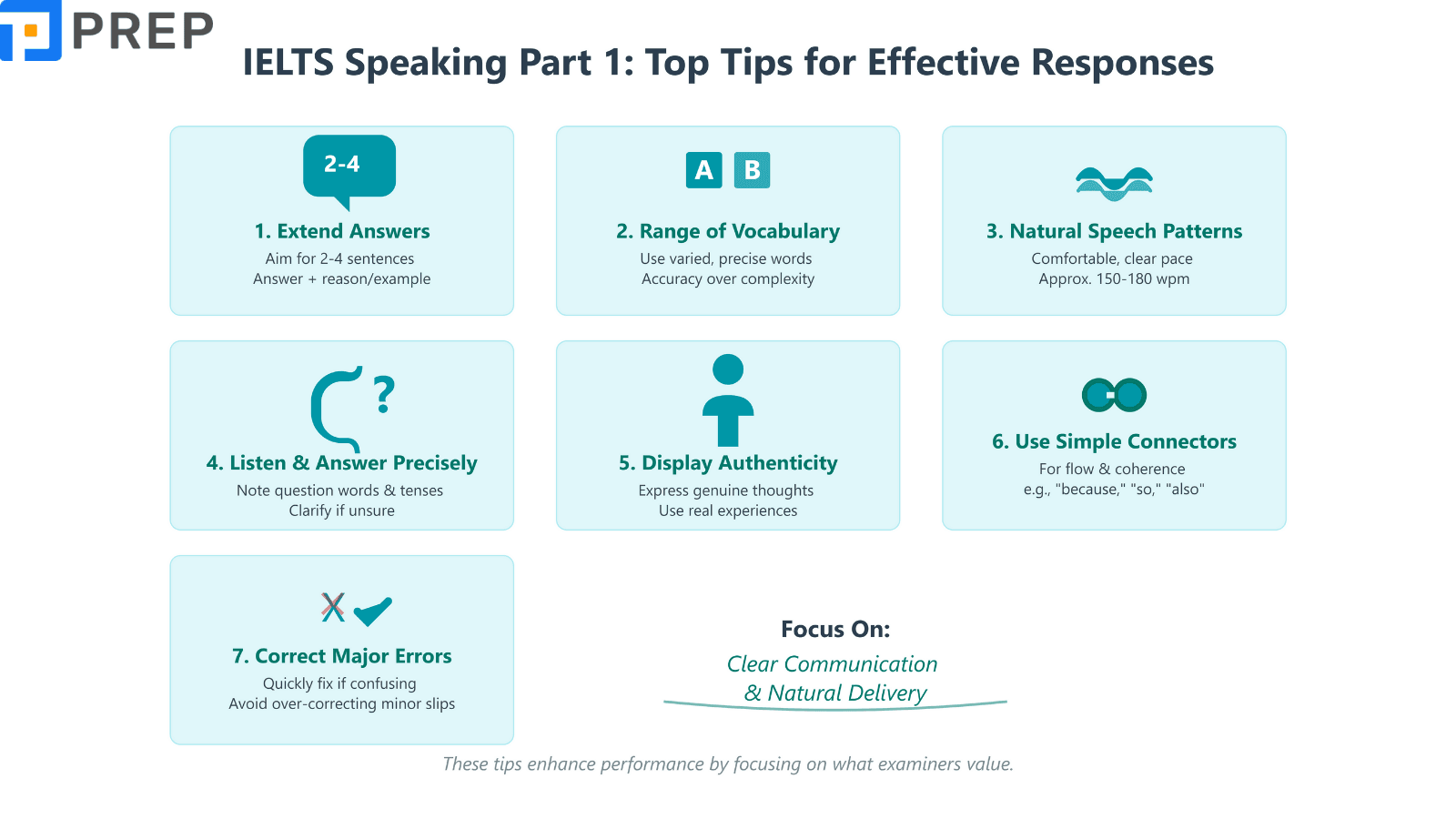Master How to Answer IELTS Speaking Part 1: Fast Strategies for a Higher Band Score
The IELTS Speaking test often causes anxiety among test-takers, yet understanding its structure can significantly boost your confidence. Part 1, the introduction phase, establishes your initial impression with the examiner. This guide offers essential insights into how to answer IELTS Speaking Part 1 effectively, explaining assessment criteria, and providing practical strategies to enhance your performance.

I. What is IELTS Speaking Part 1?
1. General Introduction
IELTS Speaking Part 1 serves as your introduction to the examiner and the assessment process. This 4-5 minute segment consists of a structured interview where the examiner asks about familiar topics related to your everyday life. The primary purpose is threefold: to verify your identity, ease you into the speaking test, and collect an initial sample of your conversational English ability.
The questions follow a predictable pattern – they're straightforward, personal, and require minimal specialized knowledge. Examiners present 2-3 everyday topics with 3-4 questions about each. The conversation flows naturally from one topic to another, with questions ranging from factual ("Do you work or study?") to opinion-based ("Do you enjoy traveling?").
Common topics in IELTS Speaking Part 1 include:
-
Work or studies
-
Home and accommodation
-
Hometown and local area
-
Family and friends
-
Hobbies and free-time activities
-
Daily routines
-
Food preferences
-
Weather and seasons
-
Transportation and travel
For instance, if the topic is "Hobbies," you might encounter questions like: "What do you enjoy doing in your free time?" and "How long have you been interested in this activity?"
2. Sample Answer
Let's examine a sample question and response to better understand how to answer IELTS Speaking Part 1 effectively.
Question: "What do you enjoy doing in your free time?"
Answer: "I'm quite passionate about photography, which I've pursued for about five years now. I particularly enjoy landscape photography because it combines my love of nature with technical skills. On weekends, I often wake up before sunrise to capture the beautiful morning light in parks and mountains near my city."
This response demonstrates several strengths. It directly addresses the question while extending beyond a simple one-sentence answer. The speaker incorporates specific details (five years, landscape photography, waking up before sunrise) and uses appropriate vocabulary ("passionate," "pursued," "capture"). The answer reveals personality and genuine interest without being overly lengthy or digressing from the topic.
II. How Your Part 1 Answers are Marked: Understanding the Criteria

When you answer IELTS Speaking Part 1 questions, examiners evaluate your performance using four distinct criteria. Understanding these assessment areas helps you focus your preparation effectively.
Fluency and Coherence evaluates how smoothly you communicate. In Part 1, this means speaking at a natural pace without excessive hesitation or repetition. The examiner looks for logical connections between your ideas, even in brief responses. Using simple linking words ("because," "however," "also") demonstrates coherence. Remember that occasional pauses are natural – native speakers pause too – but try to avoid long silences or constant self-correction.
Lexical Resource refers to your vocabulary range and accuracy. For Part 1, you should demonstrate appropriate everyday vocabulary for familiar topics. Examiners value precision – using the exact word that conveys your meaning. They also note your ability to paraphrase when you can't recall a specific term. While specialized vocabulary can impress, using it incorrectly may lower your score. Focus on natural, accurate word choices that clearly express your thoughts.
Grammatical Range and Accuracy assesses your command of English structures. Part 1 responses require basic grammar patterns, but incorporating some complex structures can elevate your score. Examiners expect proper tense usage, subject-verb agreement, and article placement. Minor errors won't significantly impact your score if they don't impede understanding. However, consistent basic mistakes will limit your band score regardless of other strengths.
Pronunciation evaluates how easily the examiner understands you. This includes clear articulation of individual sounds, appropriate word stress, and natural intonation patterns. Your accent isn't penalized – many accents are perfectly acceptable in English. The crucial factor is intelligibility. Focus on pronouncing word endings clearly and emphasizing the correct syllables in multi-syllable words. Natural rhythm and stress patterns contribute significantly to comprehensibility.
For Part 1, examiners don't expect perfection across all criteria. The questions are deliberately straightforward to allow you to demonstrate your fundamental English communication skills. Aim for clarity, accuracy, and natural delivery rather than unnecessarily complex language.
III. Answer IELTS Speaking Part 1: top tips for Effective responses

1. Extend Your Answers Appropriately
The golden rule for Part 1 is providing enough information without delivering a monologue. Aim for 2-4 sentences per answer. A complete response typically includes your direct answer plus a reason, example, or additional detail. This approach demonstrates your ability to develop ideas while maintaining relevance. When the examiner nods or begins forming their next question, recognize this as a signal to conclude your response.
2. Incorporate a Range of Vocabulary
Showcase your lexical resource by using precise, varied vocabulary. Instead of repeating "I like" for every preference, incorporate alternatives such as "I enjoy," "I'm fond of," or "I'm keen on." When discussing common topics, prepare subject-specific vocabulary. For instance, if describing your hometown, terms like "metropolitan," "scenic," or "bustling" add sophistication. However, prioritize accuracy over complexity – using simpler words correctly trumps misusing advanced terms.
3. Maintain Natural Speech Patterns
Speaking at a comfortable pace allows for clearer articulation and gives you time to formulate thoughts. Resist the urge to race through answers, which typically leads to pronunciation errors and reduced coherence. Conversely, speaking too slowly creates an unnatural rhythm. Practice speaking at a pace that feels conversational, approximately 150-180 words per minute for most English speakers. This natural cadence helps the examiner follow your ideas effortlessly.
4. Listen Carefully and Answer Precisely
Each question is deliberately crafted to elicit specific information. Pay close attention to question words (what, when, how often, why) and tenses, as these dictate the expected response format. If asked "Do you prefer X or Y?" ensure your answer identifies a preference between the options. When uncertain about a question's meaning, politely request clarification rather than providing an irrelevant answer. This demonstrates communication skills valuable in real-world contexts.
5. Display Authentic Personality
The examiner assesses language, not personal opinions. Express genuine thoughts rather than what you imagine the examiner wants to hear. Authentic responses flow more naturally and typically contain richer vocabulary. Your real experiences provide concrete details that enhance answers. This authenticity also helps reduce anxiety by transforming the test into a genuine conversation rather than a performance.
6. Incorporate Simple Connectors
Even brief responses benefit from logical organization. Simple connecting words ("because," "however," "in addition") demonstrate coherence without requiring complex structures. These connections make your speech flow naturally and help the examiner follow your thoughts. For example, instead of "I like swimming. It's relaxing," say "I like swimming because it's relaxing." This minor adjustment significantly improves coherence.
7. Correct Significant Errors Efficiently
When you recognize a major error that might confuse the examiner, a quick correction shows your awareness of language rules. For instance, if you use the wrong tense, simply restate the verb correctly and continue. However, avoid excessive self-correction, particularly for minor issues that don't affect meaning. Constant interrupting yourself disrupts fluency and creates an impression of insecurity.
These IELTS Speaking Part 1 tips can significantly enhance your performance by focusing on what examiners actually value.
IV. Your 2 Most Frequently Asked Questions (FAQs) Answered
FAQ 1: How long should my answers be in Part 1?
Your Part 1 responses should generally span 2-4 sentences, totaling approximately 20-30 seconds per answer. This length demonstrates your ability to develop ideas beyond minimal responses while respecting the brief, introductory nature of Part 1. Single-word or single-sentence answers appear underdeveloped and provide insufficient language samples for assessment. Conversely, extensive responses exceeding 45 seconds may seem rehearsed or digressive.
The ideal structure includes your direct answer followed by supporting information – perhaps a reason, example, or additional detail. For instance, if asked about a favorite season, rather than simply stating "I prefer summer," add "I enjoy summer because the warm weather allows for outdoor activities like hiking and swimming. Plus, the longer daylight hours mean I can make the most of each day." This response demonstrates adequate development while maintaining focus on the question.
FAQ 2: What if I don't understand the question or don't have an answer?
Communication breakdowns occur even between fluent speakers, so requesting clarification demonstrates real-world language skills rather than deficiency. If you don't understand a question, politely say, "I'm sorry, could you please repeat that?" or "I'm not sure I understand. Could you rephrase the question?" These phrases buy processing time while showing your ability to manage communication challenges.
For questions about experiences you lack, honesty works better than fabrication. If asked about driving but you don't drive, acknowledge this reality: "Actually, I don't drive yet, but I'm planning to take lessons next year because public transportation in my area is quite limited." This approach maintains authenticity while still providing sufficient language for assessment. Remember that examiners evaluate your English, not your life experiences.
The IELTS Speaking test measures communication ability, not perfect language. By understanding Part 1's structure, assessment criteria, and effective response strategies, you position yourself for success. Remember that examiners want to hear your natural, fluent English rather than memorized perfection. Approach the test as a conversation rather than an examination, and you'll likely find your confidence and performance improving significantly.
With regular practice and these targeted strategies, you'll develop the skills needed to answer IELTS Speaking Part 1 questions effectively, establishing a positive foundation for the remainder of your speaking test. Focus on communicating clearly and naturally, and the bands will follow.

Hi I'm Chloe, and I am currently serving as an Product Content Administrator at Prep Education. With over five years of experience in independent online IELTS study and exam preparation, I am confident in my ability to support learners in achieving their highest possible scores.
Comment
Premium content
View allPersonalized roadmap
Most read












